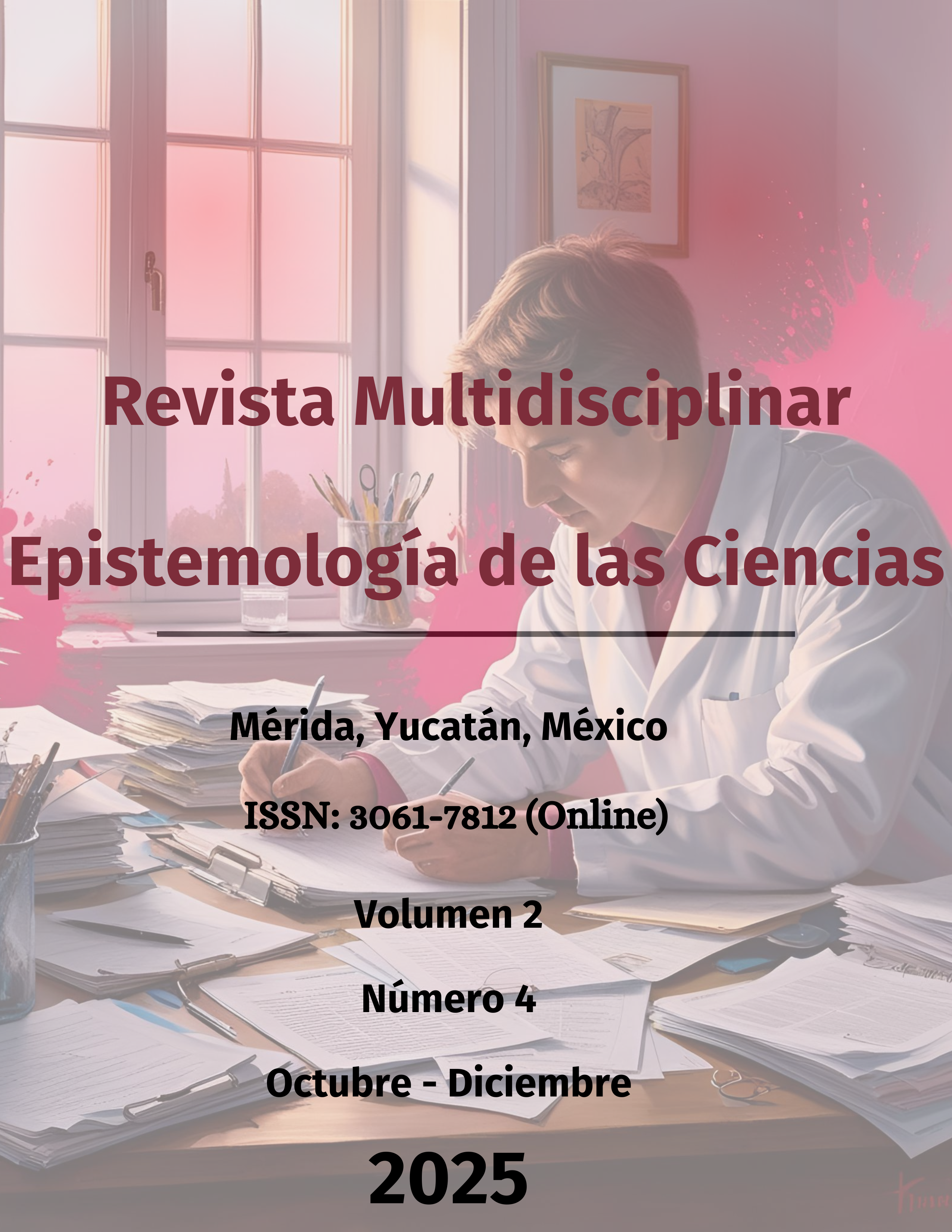Application of neurodidactic strategies in the learning of Natural Sciences for students with learning difficulties
DOI:
https://doi.org/10.71112/knqbrb61Keywords:
neurodidactics, learning disabilities, Natural Sciences, educational inclusion, meaningful learningAbstract
This study analyzes the application of neurodidactic strategies to strengthen the learning of Natural Sciences among students with learning disabilities at a public institution in Ecuador. A sequential explanatory mixed-method research design was used, combining academic performance tests with interviews and focus groups to understand the strategies' impact. The intervention included multisensory activities, playful dynamics, practical experimentation, and active breaks, aimed at stimulating students' attention, memory, and motivation. The results show that the use of neurodidactic strategies promotes meaningful learning, increases classroom participation, and improves academic performance in Natural Sciences content. However, limitations associated with teacher training and the availability of inclusive teaching resources were identified. It is concluded that the integration of neurodidactic approaches in Natural Sciences teaching constitutes an effective alternative for addressing educational diversity and promoting equity in inclusive contexts.
Downloads
References
Alreshidi, N. A. K., & Lally, V. (2024). The effectiveness of training teachers in problem-based learning implementation on students’ outcomes: A mixed-method study. Humanities and Social Sciences Communications, 11, 1137. https://doi.org/10.1057/s41599-024-03638-6 DOI: https://doi.org/10.1057/s41599-024-03638-6
Avci, B. (2021). Research methodology in critical natural sciences education. International Journal of Research & Method in Education, 44(2), 135–150. https://doi.org/10.1080/1743727X.2020.1728527 DOI: https://doi.org/10.1080/1743727X.2020.1728527
Bosica, J., Pyper, J. S., & MacGregor, S. (2021). Incorporating problem-based learning in a secondary school natural sciences preservice teacher education course. Teaching and Teacher Education, 102, 103335. https://doi.org/10.1016/j.tate.2021.103335 DOI: https://doi.org/10.1016/j.tate.2021.103335
Bron, J. F., & Prudente, M. S. (2024). Examining the effect of problem-based learning approach on learners’ natural sciences creativity: A meta-analysis. International Journal for Research in Education and Science (IJRES), 10(3), 653–668. https://doi.org/10.46328/ijres.3456 DOI: https://doi.org/10.46328/ijres.3456
Creswell, J. W., & Plano Clark, V. L. (2018). Designing and conducting mixed methods research (3rd ed.). SAGE.
Cuong, L. M., Tien-Trung, N., Ngu, P. N. H., Vangchia, V., Thao, N. P., & Thao, T. T. P. (2025). Natural sciences problem-solving research in high school education: Trends and insights from the Scopus database (1983–2023). European Journal of Science and Natural Sciences Education, 13(2), 77–89. https://doi.org/10.30935/scimath/16038 DOI: https://doi.org/10.30935/scimath/16038
Erdem, E., Toprak, M., & Kara, Y. (2024). Effects of problem-based learning on natural sciences achievement and reasoning skills in secondary school students. Educational Studies, 50(2), 145–162. https://doi.org/10.1080/03055698.2022.2103650 DOI: https://doi.org/10.1080/03055698.2022.2103650
Fetters, M. D., Curry, L. A., & Creswell, J. W. (2013). Achieving integration in mixed methods designs—Principles and practices. Health Services Research, 48(6 Pt 2), 2134–2156. https://doi.org/10.1111/1475-6773.12117 DOI: https://doi.org/10.1111/1475-6773.12117
Fyfe, E. R., Byers, C., & Nelson, L. J. (2022). The benefits of a metacognitive lesson on children’s understanding of natural sciences equivalence, arithmetic, and place value. Journal of Educational Psychology, 114(6), 1292–1306. https://doi.org/10.1037/edu0000715 DOI: https://doi.org/10.1037/edu0000715
Hidayat, R., et al. (2025). A meta-analysis of the effect of metacognitive instruction on natural sciences achievement, metacognitive skills, and various outcomes. Cogent Education, 12(1), 2517510. https://doi.org/10.1080/2331186X.2025.2517510 DOI: https://doi.org/10.1080/2331186X.2025.2517510
Johnson, R. B., & Onwuegbuzie, A. J. (2004). Mixed methods research: A research paradigm whose time has come. Educational Researcher, 33(7), 14–26. https://doi.org/10.3102/0013189X033007014 DOI: https://doi.org/10.3102/0013189X033007014
Kramarski, B., & Mevarech, Z. R. (2003). Enhancing natural sciences reasoning in the classroom: The effects of cooperative learning and metacognitive training. American Educational Research Journal, 40(1), 281–310. https://doi.org/10.3102/00028312040001281 DOI: https://doi.org/10.3102/00028312040001281
Kusaka, S., et al. (2025). Metacognitive skills in collaborative problem solving in natural sciences. Journal of Educational Research, 118(2), 210–225. https://doi.org/10.1080/00220671.2025.2486473 DOI: https://doi.org/10.1080/00220671.2025.2486473
Miles, M. B., Huberman, A. M., & Saldaña, J. (2019). Qualitative data analysis (4th ed.). SAGE.
Patton, M. Q. (2015). Qualitative research & evaluation methods (4th ed.). SAGE.
Patunah, I. N., Herman, T., & Hasanah, N. (2024). The effect of problem-based learning on students’ natural sciences problem-solving skills: A quasi-experimental study in secondary schools. Jurnal Pendidikan Matematika dan Ilmu Pengetahuan Alam, 25(3), 1067–1079. https://doi.org/10.23960/jpmipa/v25i3.pp1067-1079 DOI: https://doi.org/10.23960/jpmipa/v25i3.pp1067-1079
Rahman, M. H., & Mondal, M. I. H. (2024). Stability, challenges, and prospects of chitosan for the delivery of anticancer drugs and tissue regenerative growth factors. Heliyon, 10(21), e39879. https://pubmed.ncbi.nlm.nih.gov/39583848/ DOI: https://doi.org/10.1016/j.heliyon.2024.e39879
Santos-Trigo, M. (2024). Problem solving in mathematics education: Tracing its foundations and current research-practice trends. ZDM–Natural Sciences Education, 56, 211–222. https://doi.org/10.1007/s11858-024-01578-8 DOI: https://doi.org/10.1007/s11858-024-01578-8
Schoenfeld, A. H. (2000). In Kelly & Lesh (Eds.), Handbook of research design in natural sciences and science education(pp. 483–502).
Shongwe, M. (2024). The effect of STEM problem-based learning on students’ natural sciences problem-solving beliefs and performance. Eurasia Journal of Natural Sciences, Science and Technology Education, 20(3), em14879. https://doi.org/10.29333/ejmste/14879 DOI: https://doi.org/10.29333/ejmste/14879
Simon, M. A. (2004). Raising issues of quality in natural sciences education research. Journal for Research in Natural Sciences Education, 35(3), 157–163. https://doi.org/10.2307/30034910 DOI: https://doi.org/10.2307/30034910
Ssali, C. (2025). Problem-based learning in secondary school natural sciences: Principles, effectiveness and challenges. Journal of Education Research, 120(3), 377–390. https://doi.org/10.1080/00131881.2025.2493255 DOI: https://doi.org/10.1080/00131881.2025.2493255
Stanton, J. D., et al. (2021). Fostering metacognition to support student learning and performance. CBE—Life Sciences Education, 20(4), es9. https://doi.org/10.1187/cbe.20-12-0289 DOI: https://doi.org/10.1187/cbe.20-12-0289
Tabuyo, A. (2024). Metacognition and natural sciences problem-solving performance of pre-service teachers. Pegem Journal of Education and Instruction, 14(4), 474–480. https://doi.org/10.47750/pegegog.14.04.45 DOI: https://doi.org/10.47750/pegegog.14.04.45
Tak, C. C., Zulnaidi, H., & Eu, L. K. (2025). Mediating role of metacognitive awareness between attitude and natural sciences reasoning in pre-service teachers. European Journal of Science and Natural Sciences Education, 13(2), 90–102. https://doi.org/10.30935/scimath/16116 DOI: https://doi.org/10.30935/scimath/16116
Teddlie, C., & Tashakkori, A. (2009). Foundations of mixed methods research. SAGE.
Ventistas, L. A. (2024). Problem solving and metacognitive strategies in natural sciences education: A systematic review. Heliyon, 10(8), e31257. https://doi.org/10.1016/j.heliyon.2024.e31257 DOI: https://doi.org/10.1016/j.heliyon.2024.e31257
Yin, R. K. (2018). Case study research and applications (6th ed.). SAGE.
Downloads
Published
Issue
Section
License
Copyright (c) 2025 Multidisciplinary Journal Epistemology of the Sciences

This work is licensed under a Creative Commons Attribution 4.0 International License.











